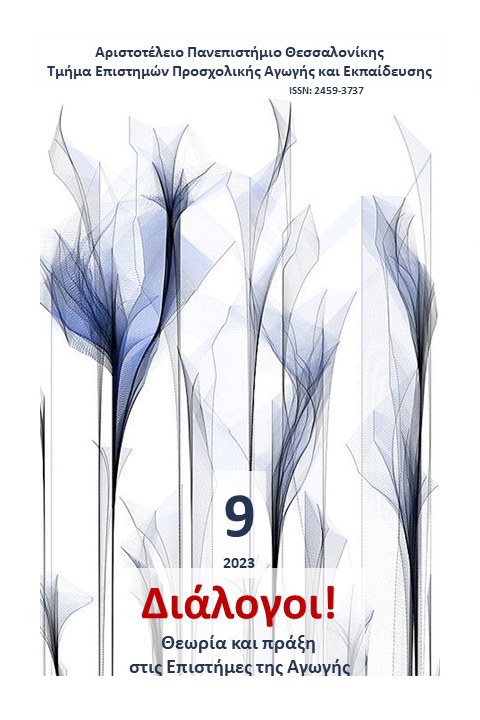Οι παιδαγωγικοί πράκτορες ως βοηθοί φθίνουσας καθοδήγησης για την ανάπτυξη μεταγνωσιακών στρατηγικών

Περίληψη
Οι παιδαγωγικοί πράκτορες στα ψηφιακά περιβάλλοντα μάθησης αξιοποιούνται ως βοηθοί που συμβάλλουν στην αλληλεπίδραση των μαθητών/τριών με το περιβάλλον και τους/τις υποστηρίζουν στη διαδικασία της μάθησης. Στην παρούσα έρευνα διερευνήθηκε η επίδραση της χρήσης τεσσάρων αφηγηματικών παιδαγωγικών πρακτόρων, ενσωματωμένων στο διαδραστικό περιβάλλον μάθησης Γεω-Ίστωρ, στην ανάπτυξη μεταγνωσιακών στρατηγικών ανάγνωσης. Οι πράκτορες αυτοί, εκπροσωπώντας αφενός την στοχοπροσήλωση (Alice) και αφετέρου τη δηλωτική (Ίρις), τη διαδικαστική (Σήφης) και την πλαισιοθετημένη γνώση (Θωμάς) λειτούργησαν ως βοηθοί φθίνουσας καθοδήγησης. Οι διάλογοι μεταξύ των πρακτόρων αυτών βασίστηκαν, κυρίως, στον μετασχηματισμό των δηλώσεων της, προσαρμοσμένης στον ελληνικό πληθυσμό, κλίμακας MARSI προκειμένου να διευρύνουν τη χρήση μεταγνωσιακών στρατηγικών ανάγνωσης από τους μαθητές/τριες. Κατά την έρευνα, που πραγματοποιήθηκε σε 54 μαθητές/τριες της Α τάξης Γενικού Λυκείου, διερευνήθηκε η αποτελεσματικότητα των παιδαγωγικών πρακτόρων κατά τη διαδραστική διδασκαλία σε σύγκριση με την αποτελεσματικότητα της διδάσκουσας κατά την παραδοσιακή διδασκαλία. Από την έρευνά μας επιβεβαιώνεται ότι οι παιδαγωγικοί πράκτορες ως βοηθοί φθίνουσας καθοδήγησης μεταγνωσιακών στρατηγικών δημιούργησαν ένα ευχάριστο περιβάλλον μάθησης και κινητοποίησαν σημαντικά τους/τις μαθητές/τριες για τη χρήση μεταγνωσιακών στρατηγικών ανάγνωσης και την αύξηση της μεταγνωσιακής τους ενημερότητας. Τα συμπεράσματα της παρούσας έρευνας συμβάλλουν στη συνεχιζόμενη συζήτηση για τις προϋποθέσεις δόμησης και χρήσης των παιδαγωγικών πρακτόρων στην εκπαιδευτική διαδικασία.
Λεπτομέρειες άρθρου
- Πώς να δημιουργήσετε Αναφορές
-
Μαυρογιάννη Α., Βασιλάκη Ε., Σπαντιδάκης Ι., & Γιαχνάκης Ε. (2023). Οι παιδαγωγικοί πράκτορες ως βοηθοί φθίνουσας καθοδήγησης για την ανάπτυξη μεταγνωσιακών στρατηγικών. Διάλογοι! Θεωρία και πράξη στις επιστήμες αγωγής και εκπαίδευσης, 9, 90–114. https://doi.org/10.12681/dial.36288
- Τεύχος
- Τόμ. 9 (2023)
- Ενότητα
- Επιστημονική Αρθογραφία

Αυτή η εργασία είναι αδειοδοτημένη υπό το CC Αναφορά Δημιουργού – Μη Εμπορική Χρήση – Παρόμοια Διανομή 4.0.
Οι συγγραφείς των άρθρων που δημοσιεύονται στο Διάλογοι! Θεωρία και Πράξη στις Επιστήμες Αγωγής και Εκπαίδευσης διατηρούν τα δικαιώματα πνευματικής ιδιοκτησίας επί των άρθρων τους, δίνοντας στο περιοδικό το δικαίωμα της πρώτης δημοσίευσης. Άρθρα που δημοσιεύονται στο Διάλογοι! Θεωρία και Πράξη στις Επιστήμες της Αγωγής και Εκπαίδευσης διατίθενται με άδεια Creative Commons 4.0 και σύμφωνα με την άδεια μπορούν να χρησιμοποιούνται ελεύθερα, με αναφορά στον/στη συγγραφέα και στην πρώτη δημοσίευση για μη κερδοσκοπικούς σκοπούς και με δικαίωμα τροποποίησης μόνον με παρόμοια διανομή (αν αναμείξετε, τροποποιήσετε, ή δημιουργήσετε πάνω στο υλικό, πρέπει να διανείμετε τις δικές σας συνεισφορές υπό την ίδια άδεια όπως και το πρωτότυπο).
To Τμήμα Επιστημών Προσχολικής Αγωγής και Εκπαίδευσης του Αριστοτέλειου Πανεπιστημίου Θεσσαλονίκης και το Εθνικό Κέντρο Τεκμηρίωσης διατηρούν το δικαίωμα να δημοσιεύουν, να αναπαραγάγουν, να παρουσιάζουν στο κοινό, να διανέμουν και να χρησιμοποιούν άρθρα που δημοσιεύονται στο Διάλογοι! Θεωρία και Πράξη στις Επιστήμες Αγωγής και Εκπαίδευσης σε οποιοδήποτε μέσο και μορφή είτε μεμονωμένα είτε ως μέρη συλλογικών έργων, για όλο το χρόνο διάρκειας προστασίας της πνευματικής ιδιοκτησίας και για όλες τις χώρες του κόσμου.
Αυτό περιλαμβάνει ενδεικτικά, και όχι αποκλειστικά, το δικαίωμα δημοσίευσης των άρθρων σε τεύχη του περιοδικού Διάλογοι! Θεωρία και Πράξη στις Επιστήμες Αγωγής και Εκπαίδευσης, αναπαραγωγής και διανομής μεμονωμένων αντιγράφων των άρθρων, αναπαραγωγής ολόκληρων των άρθρων σε άλλη έκδοση του Τμήματος Επιστημών Προσχολικής Αγωγής και Εκπαίδευσης του Αριστοτέλειου Πανεπιστημίου Θεσσαλονίκης και του Εθνικού Κέντρου Τεκμηρίωσης και αναπαραγωγής και διανομής των άρθρων ή περίληψης αυτών με χρήση πληροφορικού συστήματος αποθετηρίου.


